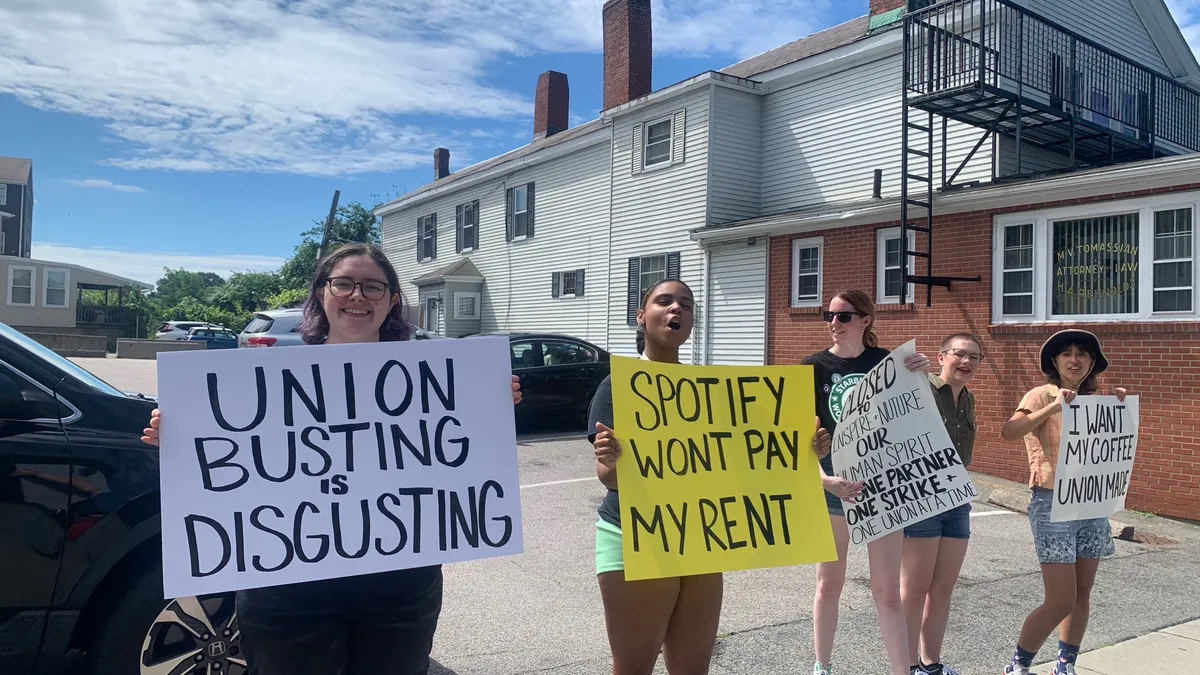Dive Brief:
- Workers United International President Lynne Fox sent a letter to Starbucks CEO Howard Schultz waiving the union’s right to bargain over changes to benefits the company is implementing in the second half of the year, including wage increases, faster sick time accrual and credit card tipping.
- When those benefits were announced, Starbucks said it would exclude unionized workers because of the requirement to bargain with workers regarding such changes.
- With wage increases set to take effect at non-union stores on Aug. 1, unionized Starbucks workers in Massachusetts staged strikes and demonstrations Monday to protest their exclusion from these benefits.
Dive Insight:
Ahead of the Aug. 1 wage increases, Workers United waived its right to bargain over the company’s announced changes to benefits. Throughout June and July, Starbucks Workers United members, bolstered by a $1 million strike fund, increased the number of one-day strikes against the company, culminating in an indefinite strike at one Boston location.
In the letter to Schultz dated July 15, Fox said Starbucks could extend benefits to union workers with the union’s agreement. “[Workers United] requests that Starbucks provide those improvements to represented employees just as it has or will to employees who are not yet represented by a union, until such time as Workers United withdraws this waiver and request,” Fox wrote.
A spokesperson for Starbucks Workers United said the company has not responded to Fox’s letter.
Starbucks is committed to bargaining over new benefits, a company spokesman told Restaurant Dive.
“We are going to follow the law established by the NLRB, which means when a group is unionized, new benefits are not allowed without good-faith bargaining,” the spokesman said. He declined, however, to comment on whether the company would extend benefits to union workers following the union’s decision to waive bargaining obligations.
A Starbucks Workers United spokesperson alleged that Starbucks announced the benefits in response to union pressure.
“This was yet another union-busting tactic to try to stop workers from organizing,” the spokesperson wrote. “And Starbucks would have never announced these new benefits if not for the pressure that the union campaign put on the company. Of course workers would waive their right to bargain over new benefits that they pressured the company into implementing.”
In addition to the benefits Starbucks announced in early May, the company said later that month it would also cover travel expenses for workers seeking gender affirming healthcare or abortions.
Starbucks workers in New England launched four new strikes and two “sip-ins” on Aug. 1, according to a press release from the Massachusetts branch of Starbucks Workers United. The union said one of those strikes, at the Starbucks on East Central St. in Worcester would last “until further notice” with daily pickets between 9 a.m. and noon. This marks the second indefinite strike of the campaign, joining a now 15-day long strike in Boston.
Bailey Fulton, a barista at the striking Worcester location, told Restaurant Dive the action was motivated by similar concerns as the strike at 874 Commonwealth Ave. in Boston. Fulton claims workers in Worcester allegedly faced transphobic comments and racist conduct from a new manager who came to the store following a union election in June. A Starbucks spokesman said the company has no tolerance for discrimination of any kind and would investigate any complaints of transphobic or racist conduct.
Fulton, who has been with the company for 16 years, said the strike was also in protest of unfair labor practices, like uneven enforcement of the company’s dress code, and anti-union actions, such as cutting hours allocated to workers at union stores.
“They have a very clear mission and values that they would like baristas to adhere to, they need to hold management to that as well,” Fulton said.
Fulton said the idea for the strike grew out of unionized workers desire to demonstrate against Starbucks excluding union workers from new benefits. Fulton also said corporate did not communicate with workers after they expressed concerns about management. Fulton said they felt corporate’s actions precipitated the strike, and that workers were not seeking a confrontation.
“It's a bummer,” Fulton said. “I don't want to be in a fight with people. I just want to show up for work and get enough hours and get paid and not have to be stressed out.”
A Starbucks spokesman said the company would exercise its legal rights to restart business in Worcester and at 874 Commonwealth Ave. He said Starbucks would consider bringing workers from other stores or potentially hiring replacement workers.










